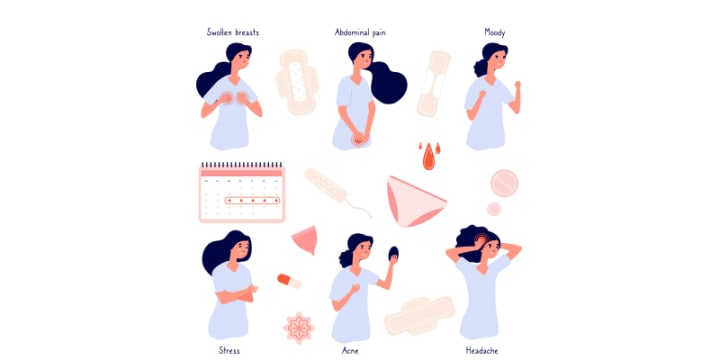Menstrual Cycle Problems
An overview of Menstrual Cycle Problems

Menstruation or Periods is defined as a normal vaginal bleeding as a part of a monthly cycle. A female body prepares for pregnancy every month. And, if in case no pregnancy occurs, the uterus sheds its lining. The menstrual blood is partly blood and tissue which passes out of the body through the vagina.
Menstrual cycles cause various uncomfortable symptoms such as mild cramping and fatigue, but the symptoms usually go away when your period begins. It is possible that a cycle that’s regular for you may be abnormal for someone else. So, it’s important to stay in tune with your body and talk to your doctor from the best gynecology hospital in Hyderabad if you notice any significant changes to your menstrual cycle. A lot of women go through unhealthy menstrual cycles. This can be caused due to a range of crucial factors.
What is an Unhealthy Menstrual Cycle?

Generally, women have menstrual periods that last for four to seven days. And, a woman's period usually occurs every 28 days. But, normal menstrual cycles can range from about 21 to 35 days. So, if there is any change in the normal menstrual cycle, it can be defined as an Unhealthy Menstrual Cycle. Some of the examples of menstrual problems include, missing three or more periods in a row, menstrual flow that is much heavier or lighter than usual and periods that last longer than seven days.
What Causes Abnormal Menstruation?
There are many causes of abnormal periods which may range from stress to more serious underlying medical conditions:-
Stress and Lifestyle Factors - Gain or loss of a significant amount of weight, dieting, frequent changes in exercise routines, sickness or other disruptions in a woman's daily routine. All of these factors can have an impact on the menstrual cycle.
Birth Control Pills - Most types of birth control pills contain a combination of estrogen and progestin while some may contain progestin alone. These birth control pills prevent pregnancy by keeping the ovaries from releasing eggs. Going on or off birth control pills can affect the menstruation cycle. Women might have irregular or missed periods for up to six months after discontinuing birth control pills.
Uterine Polyps or Fibroids - Uterine polyps are small benign growths in the lining of the uterus. These are tumors that attach to the wall of the uterus. They are usually benign but may cause heavy bleeding and pain during periods. In case the fibroids are large, they might put pressure on the bladder or rectum, causing discomfort.
Endometriosis - The endometrial tissue lining the uterus breaks down every month. It gets discharged with the menstrual flow. Endometriosis may cause abnormal bleeding, cramps or pain before and during periods, and even lead to painful intercourse.
What are the Disorders of Menstrual Cycle?
Here mentioned are common menstrual disorders that every woman should be aware of:-
Heavy Menstrual Bleeding
A huge number of women bleed heavily during their periods. This heavy bleeding can be caused by hormonal imbalances, structural abnormalities in the uterus and other medical conditions such as thyroid problems, liver or kidney disease, leukemia, miscarriage, and infections.
Amenorrhea or No Menstrual Bleeding
Lack of menstrual periods is called amenorrhea. If it is experienced in a female that has turned 16 but has not started menstruation it may be due to an issue in the endocrine system. It can also be a result of low body weight to delayed maturing of the pituitary gland.
Dysmenorrhea or Painful Menstruation
Most women must have experienced menstrual cramps at some point or the other during their lives. However, if cramps are immensely painful and persistent, it is termed as Dysmenorrhea, which may be caused by uterine contractions.
Premenstrual Syndrome (PMS)

PMS includes several physical and psychological symptoms associated with the menstrual cycle. Some of the symptoms of PMS include bloating, headaches, fatigue, anger, anxiety, mood swings, crying and even depression. These symptoms may occur about a week before your periods.
How Can Menstrual Cycle Problems be Treated?
To help control heavy bleeding, hormones such as estrogen or progestin might be prescribed. Mild to moderate pain or cramps might be reduced by taking an over-the-counter pain reliever. For example, ibuprofen or acetaminophen.
How Can the Risk of Abnormal Menstruation be Significantly Reduced?
To reduce the risk of abnormal menstruation or menstrual cycle problems, try to maintain a healthy lifestyle by exercising moderately and eating nutritious foods. Make sure you get enough rest and practice stress reduction and relaxation techniques. Use birth control pills or other contraceptive methods only as directed by the doctor. Do not forget to change your sanitary napkins every four to six hours to avoid toxic shock syndrome and prevent infections.
For more detailed information regarding Periods, Menstrual cup overview and problems related to Menstruation, you must get in touch with a reputed Gynecologist.
About the Creator
Sri Sri Holistic
https://www.srisriholistichospitals.com/





Comments
There are no comments for this story
Be the first to respond and start the conversation.